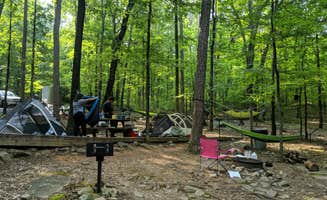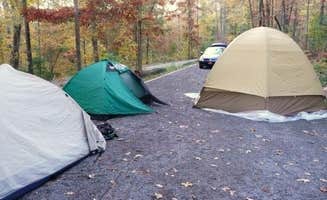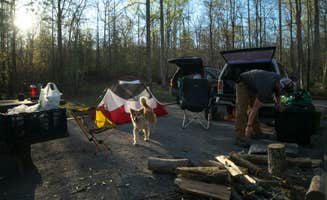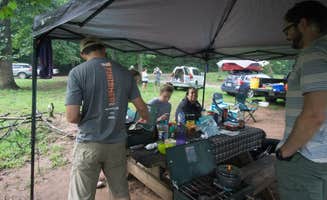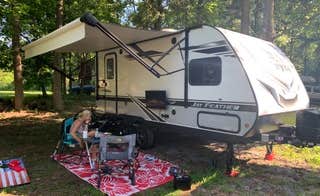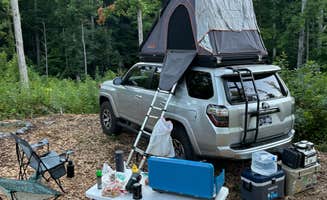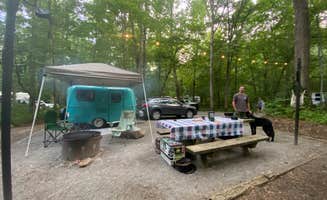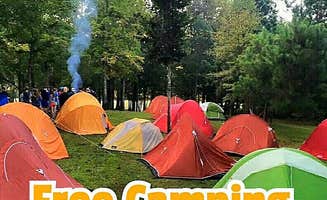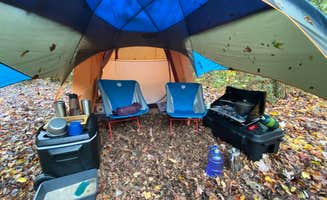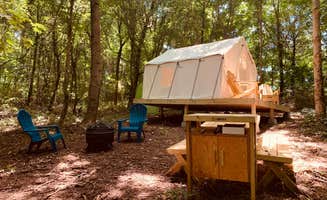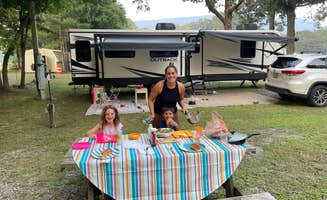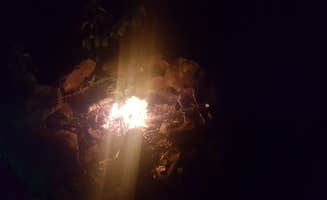Dispersed camping near Benton, Tennessee offers opportunities for backcountry exploration at elevations ranging from 800 to 2,200 feet in the Cherokee National Forest. The area experiences four distinct seasons with winter temperatures frequently dropping below freezing, while summer daytime highs can reach into the 90s with significant humidity. Most primitive camping areas remain accessible year-round but lack water hookups during winter months when freezing temperatures can affect water systems.
What to do
Creek exploration: 3 miles from campsites. At Lost Creek Campground, the creek serves as a natural attraction for wading or cooling off. "This is a great spot in the river. Picnic tables, fire ring, pit toilet and all you hear is the river at night. No cell service and its first come first served for a spot," notes Charles H.
Mountain biking: Multiple trail networks. The area has dedicated mountain biking trails accessible from several campgrounds. "There is wonderful mountain biking easily accessible from the camp and world class white water rapids within only a few miles drive," mentions Tyler J. about the Chilhowee area. Some trails have challenging elevation changes requiring proper equipment.
Whitewater activities: Seasonal water releases. The Ocoee River offers water recreation with scheduled releases. A camper at Parksville Lake RV Campground advises, "Plan your visit around the water release. There schedule is online. Pretty cool to see the water trickle and then mass if water come at you."
What campers like
Privacy in wilderness settings. Forest camping spots provide seclusion from neighboring sites. "This little site was a great get away... We chose a spot next to the creek. Was clear and flowing due to a lot of rain the few days before we arrived. Sites had concrete picnic tables and a pad," shares Scott E. about Lost Creek.
Heated facilities during winter. Some campgrounds maintain year-round operations with heated bathhouses. A visitor to Gee Creek Campground noted, "The park has a nice size bath house that is heated during the winter. The showers are push valve with no temperature control, so you will periodically have to push the valve for water."
Wildlife viewing opportunities. The area supports diverse wildlife including black bears. "We had a great family outing. Bathrooms were clean and site were nice too," reports Nathan B. about Gee Creek Campground, while other reviewers frequently mention encountering wildlife during their stays.
What you should know
Remote locations affect cell service. Cell coverage varies dramatically across the region. A visitor to Chilhowee reported, "In the B loop there is NO AT&T in spite of what this site says. You may get a weak signal on the other side, but it's spotty at best. There appeared to be a Verizon tower on the mountain, so that will probably work."
Gravel road access to remote sites. Some campgrounds require driving on unpaved roads. "Lost cove campground can be found deep in the wilderness of the Cherokee National Forest outside of Benton, TN... Once leaving the pavement of the main road and traversing a well maintained gravel road for 7 miles you will reach the Lost Cove Campground," explains Gregg G.
Limited amenities at primitive sites. Dispersed camping areas have basic facilities. "Your classic primitive campground. No generators, water, or porta potties. How camping in the forest should be!" states Tyler J. about Lost Creek. Plan to bring all supplies including drinking water to these locations.
Tips for camping with families
Swimming options: Lake and creek access. For families with children, Thunder Rock Campground offers water access. "This is a really great car camping campground along the Ocoee River. The space is divided up into a campground and a day-use area," shares Asher K. Many families bring water toys during summer months.
Playground availability: Limited in forest areas. Most primitive campgrounds lack dedicated play structures. "There's no approved place to wash dishes, the bath house and water pump both specifically say not to clean dishes in the area. My guess is this is due to the possibility of attracting black bears," notes Brittney W. about Thunder Rock.
Bear-proof storage: Required at all sites. Food must be properly stored in all camping areas. "We stayed at site #39. Next to the trail that leads to the lake. Next to rest room, trash bin, and water spout," mentions a camper about their experience with wildlife management facilities available at campgrounds.
Tips from RVers
Limited hookup options: Plan for boondocking. Most forest service campgrounds offer electric but not full hookups. At Adventures Unlimited Campground, "The rv sites have water and electric, and they have a dump station," according to Lori H. This pattern is consistent across the region.
Navigation challenges: Steep, narrow roads. RV access to some campgrounds requires careful driving. "To get to this campground you have to go up a steep narrow windy mountain road," warns Carissa D. about access to one camping area. Many reviews recommend smaller rigs for certain campgrounds.
Central dump stations: Not at all locations. Plan waste management accordingly. "From the B loop, you have to traverse about a 120 degree switchback to get to it. My friend who was there pulling a 5th wheel decided not to try it and opted to pay to dump somewhere else," advises a camper about navigating dump stations with larger rigs.


